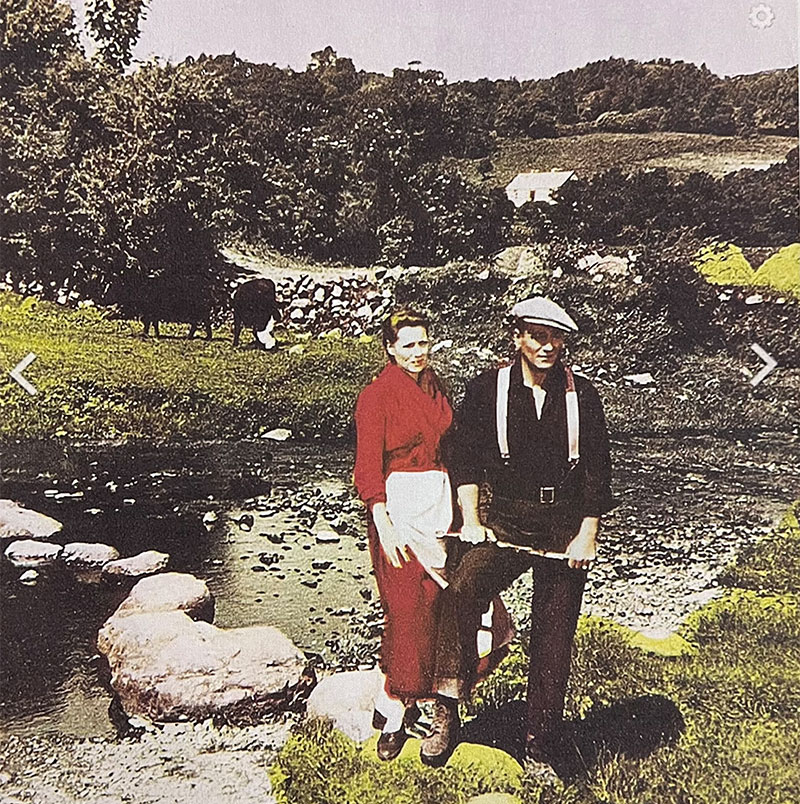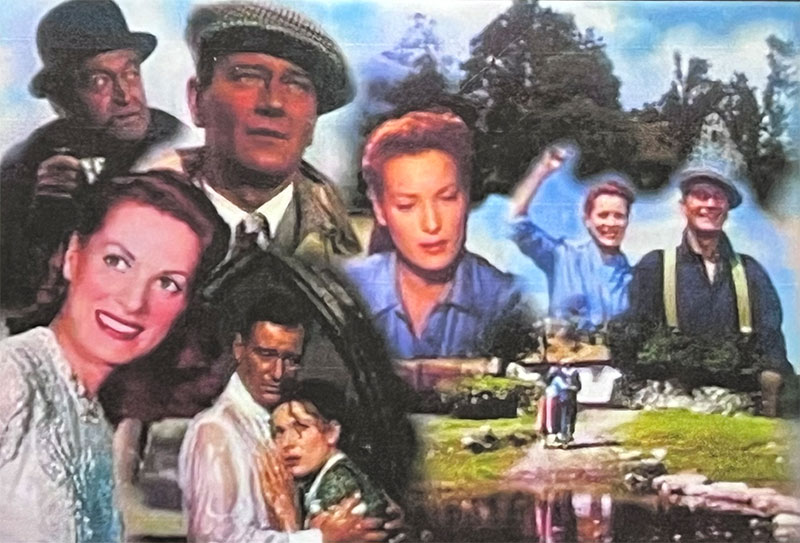
What, you ask, is “an Isle of Innisfree”? To me it is an almost mystical place that resides in one’s memories, carefully hidden away from “outsider” eyes, available only to the one whose memory vault is locked securely from those who didn’t share one or more of those “ancient reminiscences” with you, such as a parent, a sibling, or a childhood friend. Except for “bits and pieces”, one’s “Isle of Innisfree” can never be fully shared with one’s children, and seldom with one’s spouse. It can only be shared with one who “lived” it. If you don’t understand what I’m saying, then you aren’t old enough to have yet discovered your own “Isle of Innisfree”!
I never knew my father’s real parents, since he was adopted in 1894 as a baby (well, that’s not entirely true—I did meet by father’s birth mother once, back around 1947, when she made her one and only visit with her son (my father), and me, for an overnight stay as she was traveling from Michigan to Florida). I knew only his adoptive mother (who was named “Lamb” at the time), my step-grandmother, Elizabeth, who was born in 1863, and who lived with us until her passing in 1949. Of my real grandparents, I only knew my maternal grandmother, whose name was Kata (Kathryn) Grgic Persin Topolnjak. She was born Kata Grgic (pronounced “Gergich”) in the little village of Kablar, in the country of Croatia, in 1884, the second daughter of Marco Grgic and Mara Prpic (pronounced “Perpich”). Her grandparents, my great-great grandparents, were named Anthony and Ana Prpic, who also came from Croatia. They passed away before I was born.
In 1905, at age 21, my grandmother Kata married my real maternal grandfather, Frank Persin—or perhaps spelled ‘Percin’- (pronounced Pershin), who was the son of Nicolas Persin and Anna Minaric (pronounced Minarich). Grandfather Frank was born in Horvat, Austria, in 1885. He and his parents moved to Croatia in his youth, and I assume that they were ethnic Croatians. Within a year or so after Frank and Kata were married, my grandfather, Frank, left for America (without his wife, Kata) to “make his fortune”. (He came to join his brother, my real Grand Uncle Mike, who had already emigrated to the U.S.). Frank’s “fortune” was earned by working in the coal mines near Pittsburg, Pennsylvania, where he settled. My grandmother, Kata, worked for seven years, saving up money by selling eggs and vegetables to her neighbors, before being able to afford a “steerage” ticket to sail to the “land of opportunity” in early 1912, to join her husband, Frank. Kata came through the Port of Baltimore (not Ellis Island), and at the station near Pittsburg, as she got off the train, she and Frank DID NOT at first recognize each other after the seven years they had been separated. My mother, who was also named Anna, was born on Dec. 25, 1912, so it appears that they quickly refamiliarized themselves with each other.
Sadly, during the terrible influenza epidemic of 1917/18, my Grandfather Frank contracted typhoid fever and lingered for 28 days before he passed away in March 1917. Within that same year my Grandmother Kata married Mike Topolnjak, whom I knew and spoke with several times over the years in my visits with them. I mention this story only because, while my Grandmother Kata could barely speak English, one time she mentioned to me her childhood recollections of living in Kablar, where she had been born in a cottage with mud floors and a thatched roof. Although I didn’t know it then (around 1950), THAT was Kata’s “Isle of Innisfree”, that special, wonderful, and humble place that existed, then, only in her mind, for she never returned to it.

My favorite motion picture of all time is John Ford’s The Quiet Man, which starred screen legends John Wayne and Maureen O’Hara. To me it was the epitome of what all movies should be—great story, great principle and supporting actors, great cinematography, great music, and no bad language. It was filmed mostly in Ireland in 1951, and released in 1952. I was working as an usher in a movie theater when it came out, and I was immediately “smitten” by The Quiet Man. I watched it numerous times during its long three or four week run (I’ve seen it at least 30 to 40 times on video since then, and I know most of the dialog by heart). Except for some traditional Irish songs, the main music (without the words) heard throughout the film was The Isle of Innisfree, written in 1949 by Dick Farrelly (1916-1990), an Irish policeman, poet, and writer (and who strangely was unaccredited by John Ford as the music’s composer). It is one of the most hauntingly beautiful of all timeless Irish melodies, on a par with Danny Boy and Galway Bay. To me, the best version is sung by Orla Fallon, that wonderful Irish singer and Celtic harpist who was part of my favorite singing group, Celtic Woman, for several years. Please watch Orla’s version of the song: “The Isle of Innisfree” on UTube. You’ll be VERY glad you did. Although it was written to honor the “Irish Memory” of people who left beautiful but troubled Ireland to emigrate to America, it could apply to anyone, such as my maternal grandparents, who left behind the land of their birth to come to a new and strange world.
THE ISLE OF INNISFREE
(Words and Music by Dick Farrelly-1949)
“I’ve met some folks who say that I’m a dreamer, And I’ve no doubt there’s truth in what they say.
But sure a body’s bound to be a dreamer when all the things he loves are far away.
And precious things are dreams unto an exile, they take him o’er the land across the sea;
Especially when it happens he’s an exile from that dear lovely Isle of Innisfree.
And when the moonlight peeps across the rooftops of this great city wondrous tho’ it be;
I scarcely feel its wonder or its laughter, I’m once again back home in Innisfree.
I wander o’er green hills thro’ dreamy valleys and find a peace no other land could know;
I hear the birds make music fit for angels and watch the rivers laughing as they flow.
And then into a humble shack I wander, my dear old home, and tenderly behold the folks I love around the turf fire gathered, On bended knees (their humble prayers are) told.
But dreams don’t last, tho’ dreams are not forgotten, and soon I’m back to stern reality;
But tho’ they paved the footways here with gold dust I still would choose the Isle of Innisfree.”
(“Innisfree” was the fictional Irish village that was the setting of the story in the film, The Quiet Man. The exterior scenes were filmed mostly in and around the real Irish village of Cong, which straddles the counties of Mayo and Galway, in Western Ireland.)
Today, in our troubled America, in a land that we, as Americans, should consider as OUR “Isle of Innisfree” (at least some portion of it), there is dissension and disunity, racial animosity and increasing authoritarian actions being perpetrated upon our people by a government that more and more seems to be enthralled with the ideas of Marxist power, intimidation, and control. It wasn’t always so, because while LEGAL immigrants have been mostly welcomed here—immigrants who, like my grandparents, tried to assimilate into American culture-- there are many now among us who have come here—and still are coming—mostly illegally with the aid and encouragement of an increasingly lawless federal government, illegals who are not all that much interested in the process of assimilation that has always been the REAL strength of America, illegals—potentially dangerous ALIENS--who have hate in their hearts and violence and destruction and killing on their minds.
The deadly “siren-song” celebrated as “diversity”—that CURSE of multi-culturalism and multiple languages—the deliberate refusal of people who ILLEGALLY come to our shores to become cultural Americans and learn the unifying language of English-- is NOT a mark of strength for the U.S. or any nation so afflicted, but is a sure recipe for eventual “Balkanization” and cultural disaster, despite the soothing platitudes and loud assurances to the contrary by radical progressives among our national and state government bureaucracies, who know that the old maxim of “divide and conquer” is still true today, because “divided” people are much more susceptible to political control as they squabble against other political and cultural groups, rather than direct their civic attention and righteous anger toward the disgusting Demoncrat politicians and their RINO allies, with their own agendas of power and control in their despicable progressive minds.
The United States of America---coalesced into a mighty free and constitutional republic by the sacrifices and the shed blood of its founding fathers and mothers, and preserved by that same blood shed by countless men and women patriots since 1775-- deserves better than to die with a whimper, as its citizens become fearful serfs in corrupt third-world style Balkanized mini-States, constantly at war with each other, while all the while those with agendas of power and control—those sovereignty-destroyers of “The New World Order” globalists, and the fascist monsters of “The World Economic Forum”-- hide in the shadows and laugh at the gullibility of Americans who, every few years, put “politics” above principles, and see only short term political gains over long time SURVIVAL, who preach (and perhaps believe) the SUBVERSIVE NONSENSE that our venerable U.S. Constitution is a “living document” that should be “re-interpreted”, rewritten, deceitfully misapplied for these “modern” times, and perhaps replaced entirely at a new and perhaps extremely DANGEROUS new Constitutional Convention, an idea being pushed, in part, by patriots who should know better. These enemies of free people will never be worthy of considering any part of America as their “Isle of Innisfree”. Too bad for them.
HERE is an American’s “Isle of Innisfree” (words by W. H. Lamb, sung to Dick Farrelly’s beautiful Irish melody):
I’ve wondered o’er green hills and lofty mountains, and found the faith that other lands should know,
I read the knowledge that our Founders gave us, and watch in awe their words of wisdom flow,
Into the hearts and minds of our great people, inscribed on lofty walls of polished stone,
Their call of freedom now and ever drives me, to fight for hearth and long always for home!
New dreams of valor always there to guide me, for dreams are signs of wondrous things to be,
But ‘till I hear my LORD’S Words call me homeward, I’ll always love my “Isle of Innisfree”!
Now that I’ve shared a bit of my personal “Isle of Innisfree”, have you given any thought to where yours is? You should, you know. Think about it long and hard, while you still have the ability to do so.













